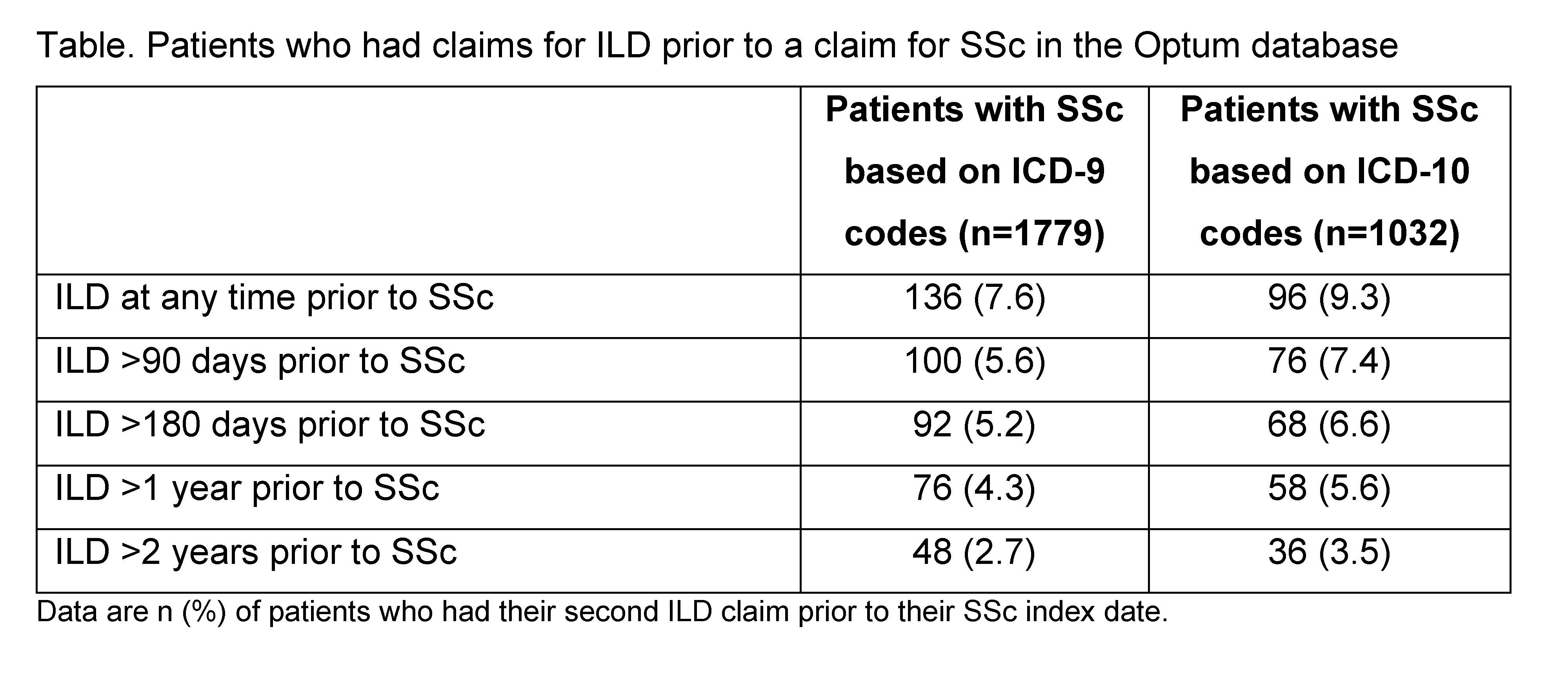Session Information
Session Type: Poster Session C
Session Time: 9:00AM-11:00AM
Background/Purpose: Interstitial lung disease (ILD) is a common manifestation of SSc. SSc-ILD is usually detected in a patient known to have SSc, but ILD may be the initial presentation of SSc. Optum is a health insurance database covering >60 million patients, which is representative of the commercially insured population in the US. We used data from the Optum database to investigate the documentation of ILD prior to a diagnosis of SSc.
Methods: The study period was between 1 January 2007 and 30 June 2019. The “ICD-9 cohort” comprised patients aged ≥18 years, with an SSc index date (date of first insurance claim related to SSc) between 1 January 2010 and 30 September 2015 based on ICD-9-CM codes, ≥2 medical claims associated with SSc on different dates within a 1-year period, and ≥3 years of continuous enrollment in the database prior to the SSc index date. The “ICD-10 cohort” comprised patients aged ≥18 years, with an SSc index date between 1 October 2017 and 30 June 2019 based on ICD-10-CM codes, ≥2 medical claims associated with SSc on different dates within a 1-year period, and ≥2 years of continuous enrollment in the database prior to the SSc index date. ILD was defined as ≥2 medical claims associated with ILD on different dates. We identified patients who had their second claim associated with ILD prior to their SSc index date in the two cohorts. Analyses were descriptive.
Results: The ICD-9 and ICD-10 cohorts consisted of 1779 and 1032 patients with SSc, respectively. In these two cohorts, 7.6% and 9.3% of patients respectively, had their second claim associated with ILD prior to their SSc index date (Table). The second ILD claim occurred >1 year prior to the SSc index date in 4.3% of patients in the ICD-9 cohort and 5.6% of patients in the ICD-10 cohort.
Conclusion: Based on data from a large US health insurance database, 4–6% of patients with SSc had claims for ILD more than 1 year prior to a claim for SSc. These data are consistent with previous studies showing that SSc can have an impact on the lung early in the course of SSc and demonstrate the importance of screening patients with ILD for SSc.
To cite this abstract in AMA style:
Assassi S, Shao N, Yin Z, Volkmann E, Zoz D, Leonard T. Understanding Diagnostic Pathways in Systemic Sclerosis and Systemic Sclerosis-Associated Interstitial Lung Disease (SSc-ILD) [abstract]. Arthritis Rheumatol. 2020; 72 (suppl 10). https://acrabstracts.org/abstract/understanding-diagnostic-pathways-in-systemic-sclerosis-and-systemic-sclerosis-associated-interstitial-lung-disease-ssc-ild/. Accessed .« Back to ACR Convergence 2020
ACR Meeting Abstracts - https://acrabstracts.org/abstract/understanding-diagnostic-pathways-in-systemic-sclerosis-and-systemic-sclerosis-associated-interstitial-lung-disease-ssc-ild/

